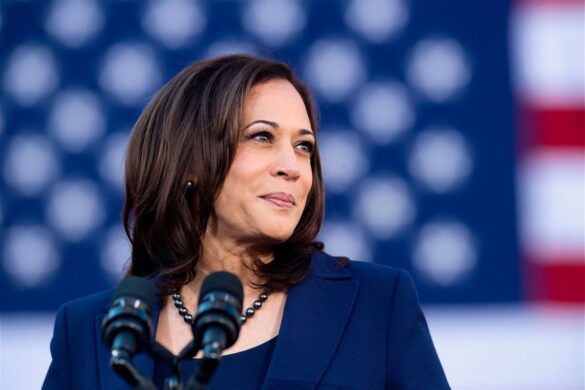The Potential Rise of Kamala Harris: A Tech-Savvy Democrat?
A New Chapter for the Democrats
Table of Contents
- A New Chapter for the Democrats
- From Bay Area Roots to Silicon Valley Ties
- A Complex Relationship with Big Tech
- Navigating the Future of Tech Policy
- Navigating the Digital Landscape: Kamala Harris’s Stance on AI, TikTok, and Cryptocurrency
- A Balancing Act: Innovation vs. Regulation
- Addressing Concerns: TikTok and National Security
- Cryptocurrency: A Complex Landscape
With President Joe Biden stepping aside from the race, Vice President Kamala Harris has emerged as a frontrunner for the Democratic nomination. Biden himself has publicly expressed his “full support and endorsement” for Harris to lead the party in the upcoming election. Harris, in turn, has stated her clear intention to “win and earn this nomination.” While it remains to be seen whether other Democratic politicians will challenge her candidacy, the stage seems set for a potential Harris-led campaign.
From Bay Area Roots to Silicon Valley Ties
A Harris presidency would mark a significant shift in the political landscape. Born in Oakland and with deep roots in the Bay Area, she possesses a unique understanding of the region’s dynamic tech scene. Her career trajectory reflects this connection: from serving as San Francisco’s District Attorney to California’s Attorney General, and ultimately her election to the Senate in 2016, Harris has consistently navigated the intersection of law and technology. This experience sets her apart from other potential nominees and positions her as a candidate who can effectively address the complex issues facing the tech industry today.
A Complex Relationship with Big Tech
Harris’s relationship with Silicon Valley is multifaceted. Early in her career, she garnered support from prominent venture capitalists like John Doerr and Ron Conway. LinkedIn co-founder Reid Hoffman was a vocal supporter during her presidential campaign. However, some critics argue that as Attorney General, Harris did not do enough to curb the growing power of tech giants. Others have called for greater transparency and accountability from these companies.
Despite these criticisms, Harris has consistently demonstrated a willingness to engage with the tech industry on critical issues. As a senator, she has pressed social media platforms on their handling of misinformation and advocated for stronger regulations to protect user privacy. Her stance reflects a nuanced approach that seeks to balance innovation with consumer protection.
As the Democratic nominee, Harris would face the challenge of crafting tech policy that addresses the concerns of both consumers and industry leaders. Her experience in law enforcement, her understanding of the tech landscape, and her willingness to engage in constructive dialogue position her well to navigate this complex terrain. The outcome of the 2024 election will have a profound impact on the future of technology, and Harris’s potential presidency could shape the regulatory environment for years to come.

A Balancing Act: Innovation vs. Regulation
Vice President Kamala Harris has consistently emphasized the need for a balanced approach to technological advancements, particularly in the realm of artificial intelligence (AI). She recognizes the immense potential of AI to drive innovation and progress but also acknowledges the inherent risks associated with its unchecked development.
Harris has publicly stated that the Biden administration rejects the false dichotomy between safeguarding public well-being and fostering innovation. This stance underscores their commitment to establishing a regulatory framework that encourages responsible AI development while mitigating potential harm. President Biden’s recent executive order, calling for corporations to implement new standards for AI safety and security, reflects this commitment. Harris has lauded these “voluntary commitments” as a crucial first step towards a safer AI future, emphasizing the need for robust government oversight to prevent tech companies from prioritizing profit over public safety and democratic values.
Addressing Concerns: TikTok and National Security
The issue of data privacy and national security has also been a focal point for Harris’s attention, particularly concerning the popular social media platform TikTok. While acknowledging concerns about ByteDance, TikTok’s parent company, and its potential influence on user data, Harris has stated that the administration does not intend to ban the app outright. Instead, they are focused on addressing the underlying issues through targeted measures aimed at protecting user information and safeguarding national security interests.
This approach reflects a broader trend in government policy towards technology companies, seeking to balance the benefits of innovation with the need for accountability and transparency. The recent bill that would force ByteDance to sell TikTok if it fails to address these concerns highlights this ongoing tension between fostering technological advancement and protecting national security.
Cryptocurrency: A Complex Landscape
While Harris has been less vocal on cryptocurrency-related issues, her stance likely aligns with the Biden administration’s broader approach to regulating emerging technologies. The recent IRS regulations for taxing cryptocurrencies demonstrate a commitment to establishing clear guidelines within this rapidly evolving space. This regulatory framework aims to ensure responsible development and use of cryptocurrencies while mitigating potential risks associated with financial instability and illicit activities.
The digital landscape is constantly evolving, presenting both opportunities and challenges. Kamala Harris’s approach reflects a nuanced understanding of these complexities, seeking to harness the power of technology while safeguarding public interests. As new technologies emerge, her commitment to finding a balance between innovation and regulation will undoubtedly continue to shape the future of the digital world.


